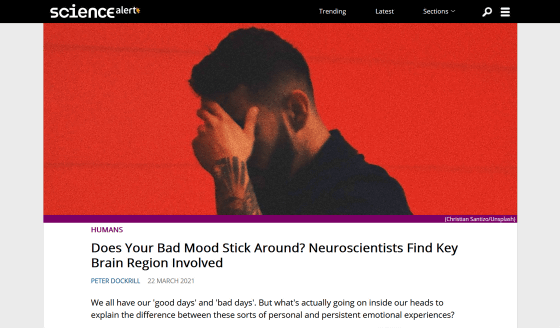Research shows that people with a brain that tends to sustain negative emotions tend to feel unhappy

There are good and bad things in life, but while some people can switch quickly when something is wrong, others find it difficult to switch. A study from the University of Miami that measured people's mood and well-being as well as brain activity found that the way parts of the brain respond to stress affects longer-term well-being. ..
Linking Amygdala Persistence to Real-World Emotional Experience and Psychological Well-Being | Journal of Neuroscience
Don't let the small stuff get you down
https://news.miami.edu/stories/2021/03/dont-let-the-small-stuff-get-you-down.html
Does Your Bad Mood Stick Around? Neuroscientists Find Key Brain Region Involved
https://www.sciencealert.com/experiment-identifies-key-brain-region-involved-when-you-can-t-shake-a-bad-mood

The sustainability of negative emotions varies from person to person, with some being able to greet a colleague refreshingly after dropping a cup of coffee, while others curse a colleague. However, few studies have investigated the relationship between the sustainability of negative emotions and overall well-being.
Therefore, a research team at the University of Miami conducted an analysis using data from 'Midlife in the US,' a longitudinal study that started in the 1990s. Midlife in the US is a physical and mental health survey of thousands of Americans, characterized by measuring psychological well-being (PWB).
In addition to responding to a questionnaire measuring PWB, Midlife in the US subjects reported 'the stressful events they experienced that day' and 'positive and negative emotions' in a telephone survey for about a week. In addition, some subjects participated in an experiment to measure brain activity by magnetic resonance imaging (fMRI) and measured brain activity when 60 positive, negative, and neutral images were viewed. That is.

The research team analyzed data from 52 people who participated in all surveys, and found that
According to the research team, the more persistent the reaction seen in the left amygdala when looking at a negative image reminiscent of violence or grotesque elements, the easier it is to remember negative emotions in daily life and the worse the PWB. .. On the other hand, people who are less likely to have a persistent stress response when looking at negative images are more likely to experience more positive emotions in their daily lives and have a higher sense of long-term happiness.
The amygdala is known to play an important role in the mental state of being activated in response to anxiety and fear, but the results of this study show that the amygdala's ability has a kind of 'spillover effect'. Suggests. In the case of a person with high amygdala persistence, negative emotions when detecting something that seems dangerous may be amplified or continued, and it may affect the way of thinking that is not related to the subsequent threat. ..
Nikki Puccetti, the lead author of the treatise, said, 'Basically, whether or not the human brain sustainably retains negative stimuli makes daily emotional experiences more negative and less positive. It turns out that it predicts the tendency to do something. ' Aaron Heller, a member of the research team and assistant professor of psychology at the University of Miami, understands the effects of negative experiences on other events, such as differences in emotions and well-being between individuals. He insisted that it was important to do so.

Related Posts:
in Science, Posted by log1h_ik







